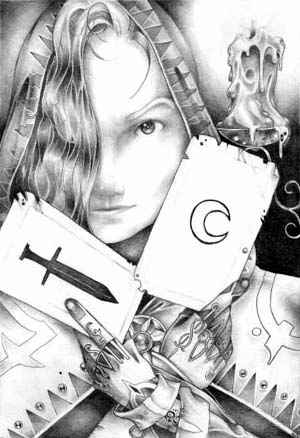|
|
|
The History of Stephen The Atlas Major Kingdoms Stephen
Like may of the Human kingdoms, the naissance of the Kingdom of Stephen can be found in the Great Exodus after the Fall of Baûl. Pilgrims of the god Halüt, fleeing the disorder of Ruûn sought to remove themseles rom suh evil as much as possible. Passing into the infant Middle Kingdoms of Kyrst and Iovia, they heard of a magical and protected valley far to the north, through the Great Forest, nestled against the towering Mountains of the Unknown: the Dévum Vale. Such a remote yet hospitable place appealed to many, yet no one who had entered the Great Forest in search of the Dévum Vale had ever returned. The Halütian pilgrims, though time and again advised against suh folly, prayed to their god for protection and then set out into the Great Forest.

These pilgrims were led by the frist great hero of Stephen's histoy: the Lord Stephen Agrûn himself. A paladin of the highest order, Lord Stephen's piety and closeness to Halüt himself was a model to each of the founders of the Kingdom. it is perhaps solely due to the Lord Agrûn's valor, virtue and piety that the Halütian pilgrims emerged from the great Forest after months of struggle, toil ad hardship. the cold nights and bitter winds of autumn wer already upon them, yet the golden hues of thelands made the pilgrims' view of the Dévum Vale all the more majestic. Sure this was a magical and holy land.
Under the threat of winter's first snowfall, the pilgrims swiftly errected a settlement in the fertile plans about what is now the city of Royale. The winter was harsh, yet through their piety and valor, the pilgrims thrived under the leadership of Lord Agrûn. A decade passed, and then two; soon Royale, Bridgeville and Aarûnvale began to grow from simple settlements to stalwart towns of great promise. Still a greatly pious people, the descendants of the first pilgrims continued to look to the Church of Halüt, and the sons of Lord Agrûn for leadership.
In the 142nd year after the Fall of Baûl, Lord Ibrahm Agrûn came of age, the grandson of Lord Stephen. To Ibrahm fell the unhappy fate of seeing both his loving father and his grandfather the hero to the next world. A bad of orcs and their ogre vermin descended from the mountains to the north of Royale, rode like thunder across the plains and threatened the good people of Halüt. Though aged, the Lord Stephen led the battle against the goblinoid horrors. The victory was great, yet at an equally great cost: Lord Stephen Agrûn ad his son, Lord Pittre, had fallen side by side in the fray.
Lord Ibrahm solemnly buried his father and grandfather. The, bent on revenge, he took up his sword and chased the orcish invaders back across the plains to their mountain lair. There he slaughtered them to the last man. Upon the ruins of the orcish lair he built a great fortress, and about it quickly grew a small city of Ibrham’s followers – the city of Kôhp. Great warriors and lords, pilgrims and priests began to seek out Kôhp, swearing fealty to the mighty Lord Ibrahm Agrûn.
By the end of his long reign, Lord Ibrahm’s court was vast and powerful. Most of the Dévum Vale had come under his control. Far removed from the evil taint of Ruûn and the aggressive Middle Kingdoms, Agrûn’s lands prospered. Lord Ibrahm surveyed this with joy, knowing that he had forged the beginning of a great kingdom. Yet, he was old and a crown would weigh too heavily upon his brow.
So, in the 168th year after the Fall of Baûl, Stephen Agrûn II, son of Ibrahm Agrûn, came of age and was crowned King of Stephen. The Kingdom was named not for the young lord but for the elder Lord Stephen, the pious paladin who had led the Halütian pilgrims to the earthly paradise of the Dévum Vale.
The Dévum Vale was large, and King Stephen II saw wisely that he could not rule its great expanse alone. The Kôhpish court teemed with worthy knights and heroes – yet which would be the best to the rule the Kingdom beneath the King? To decide the merit of each member of his court, King Stephen II held a great Joust where the greatest warriors of the land prevailed, and were awarded with duchies of their own.
Thus in the naissance of the Kingdom of Stephen the duchies of Royale, Bridgeville and Aarûnvale were awarded. Soon in the coming years, the duchies of Nyr Kôhpitol and Forestvale came to be. For many generations, nearly a millenium, the Kingdom steadily grew and prospered. The cities and duchies of Fyr Kôhpitol, Dûcton and Majin appeared and Stephen rested easily in the Great Peace that followed in the wake of Baûl’s Fall.
Yet, in more recent times treachery has agitated in the Kingdom of Stephen. In the 1550th yea after the Fall of Baûl, King Pittre XI, of the Bizmet dynasty was close to death – but lacked an heir. Rumors abounded that the King had once sired an illegitimate son may years ago, but the child was a substantive as the rumors themselves: vaporous at best. So, the nobility clamored to claim the crown of the dying monarch, reaching far back into the annals of history to find some tie, no matter how tenuous, to any king of Stephen. Some even claimed relation to the Lords Agrûn themselves, whose family had died out 600 years after the Fall of Baûl.
As the King’s health further waned, the bickering in his court intensified: enemies were made ad allies joined amongst myriad factions. Supporters, warriors and even small armies began to gather outside the city walls of Kôhp. On the day of the King’s death, seven armies marched onto the battlefield below the capital city.
From the duchy of Nyr Kôhpitol came Lady Aurelia Disbane and a formidable army. Lady Disbane claimed no relation any king of the Kingdom, indeed she was staunchly proud of her lineage; yet, through sheer force of sword and will she was ready to wrest the crown from any challenger. Alongside the great force of Nyr Kôhpitol came that of Royale, a rag-tag band of men who Lady Disbane tolerated only because it lent more weight to her blow.
Most opposed to the armies of Nyr Kôhpitol and Royale were the powerful forces of Bridgeville. Duke Greyson, like the Duchess Disbane, claimed no title to the crown, yet knew that those who could take it by force could wield great power likewise.
From Forestvale a great troop of Rangers and woodsmen gathered beneath Kôhp as well. Duke Aleun Foray could actually claim relation to the Bizmet family, if only by a distant marriage. Yet, he was more interested in stopping the great war that would erupt amongst the bickering nobility than in ascending the throne himself.
From the distant but wealthy settlement of Kôl came a another rag-tag force: mercenaries and dwarven warriors accustomed to hard lives on the Frozen Plains and within the unforgiving Earth came to stake their own claim, half by force and half by blood. Duke Firbund Dysc claimed a long forgotten relation to the family Agrûn.
Finally, in a vain attempt to suppress these armies and impose order upon a kingdom gone awry, Kalic Dryst, the late King’s prime minister, led the remnants of the Royal Guard onto the field.
With the light of day, the many armies joined with a thunderous roar. The battle was a terrible and chaotic fray, for how does one attack six enemies at once? How does one defend against such a threat? The slaughter was terrible as neighbor fell upon neighbor and brother upon brother in the name of greed and power.
As the noon-day sun glared upon the blood-soaked battlefield, a small band of Adventurers appeared upon a hill which overlooked the fields beneath Kôhp. This band included two great companies of heroes: the Gold and Silver medallions. Amongst their numbers were Bûd and Rashel, warriors of renown, the mystic Rebekah, her husband Reakyun the Terrible, and the hero Jaysin Whitefrost. With these two great companies were four others: three elves clad in uniform grey robes, wielding not weapons but magic. The fourth figure stood tall and slim, a human man clad all in black.
This band of heroes looked grimly upon the battle, which continued in unparalleled fury below. Then, with a start, they clamored to join the fray themselves. With stalwart valor and great magicks they fought directly into the center of the battle. There, as the warriors held back the great tumult of war, the black-lad man stood forward and simply raised his hands. From him issued a great wave of force, which sounded as a tremendous scream in the mind of every man on the field. In moments, the man in black and his companions were the only ones standing.
Thus King Xerxes Bizmet came to power. Revealing himself to be the lost, if bastard son of King Pittre XI, Xerxes had a claim to the throne by blood far more legitimate than any others. With his triumph at the Battle of the Seven Armies, he furthermore made a claim to the throne by force. The greatest heroes of the Kingdom stood behind him, and it was clear that he held great powers in his own right.
This is not to say that Xerxes is a tyrant, for he reigns to this day. Indeed, he is the most benevolent ruler Stephen has known for may generations. Living so long in unknown exile, King Xerxes gives much attention to plight of the commonfolk. Conversely, the nobility of the Stephen, especially may of the ruling dukes and duchesses of the court, now chafe at Xerxes’ reign. However, peace has now returned to the Kingdom, though the royal court often boils and tumbles with covert dealings and subtle treachery.
copyright february 2000
noah mclaughlin